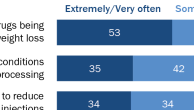Susannah Fox testified at a meeting organized by the National Committee on Vital Health Statistics and the U.S. Department of Health and Human Services to discover privacy, security, and confidentiality issues around personal health records, social media, and the future of medicine.
The major points:
There are pockets of people who remain offline, but the advent of mobile internet access may change that.
Our understanding of what the “internet” is will change over the next few years as more people access it on small screens, wherever they are, not necessarily on desktop screens at home or at work.
Americans’ pursuit of health takes place within a widening network of both online and offline sources.
Americans increasingly want access to industrial-strength information, not consumer-strength. In the political arena, more adults than ever before used the internet to read or watch “unfiltered” campaign material last year, such as candidate debates, announcements, position papers, and speech transcripts. In the health arena, e-patients are reading medical journal articles, viewing photos or video of other people with similar conditions, and uploading details of their symptoms and treatments.
What if personal health records could be designed to be part of the naturally-occurring network we see in the Pew Internet Project’s survey data? What if personal health records could take account of the primary relationship between a patient and a health professional, but not make it an exclusive relationship? What if, instead of a health information exchange being one-to-one, a personal health record allowed it to be many-to-many? What if a personal health record gave people access to what the doctors and nurses and insurance companies see, that is, the industrial-strength information? Finally, is it meaningful if a patient can’t use it?
The following illustrations display three “thermometers” of access based on the Pew Internet Project’s December 2008 telephone survey. Interviews were conducted in English or Spanish with 2,253 adults, age 18 and older, including 502 cell phone interviews.




